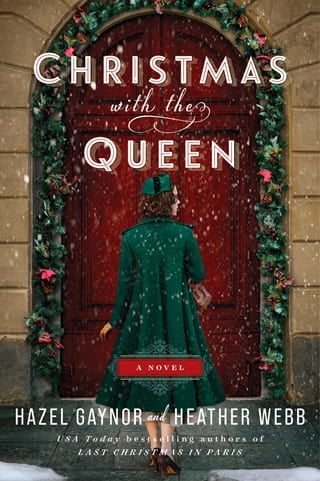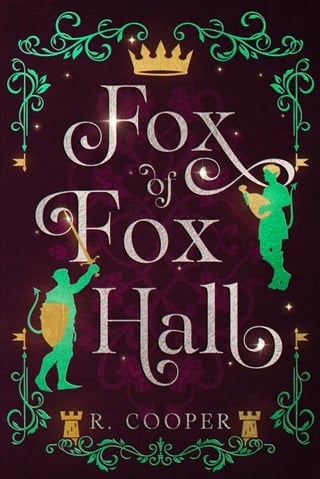Chapter 25 Jack
Chapter 25
Jack
Royal Yacht SS Gothic , South Pacific, December 1953
A nother week at sea had passed and Christmas was nearly upon us. We were to dock in Auckland in two days, where the queen and duke would disembark with the necessary staff for their tour duties. The rest of us would remain on the ship. We were looking forward to the ease of those days and a quieter Christmas.
We were winding down for the night after a difficult dinner service through choppy waters, when a surprise visitor brought us all to immediate attention.
The queen.
“Your Majesty, good evening,” Max said. “Can we be of any assistance?”
“I should like to speak to Jack Devereux. Is he here?”
Max’s eyebrows rose in surprise. “Yes, ma’am.”
I jerked my head up from cleaning my station, surprised by her request. What could the queen want with me? I hoped I hadn’t displeased her in some way. I hastily wiped my hands and walked toward her.
“How may I be of service, ma’am?” I towered over her petite frame, but her presence emanated regality and importance and made me feel rather small beside her. I briefly wondered what the burden of such huge responsibility must be like for her.
She didn’t so much as break eye contact.
“My husband is rather enamoured with the idea of a Cajun cook from Louisiana,” she replied. “He’s an adventurous man, you see—well-traveled—and he would be simply delighted if you could make a dish for him. Perhaps tomorrow for lunch service?”
“I’d be honored, ma’am.”
A hint of mischief flashed in her blue eyes. “Be sure it has plenty of spice.”
“I wouldn’t make it any other way, ma’am.”
At that, she offered a slight smile, before leaving through the galley door.
The queen continued to surprise me, as did the duke. They were both rigorously professional in their royal roles, but always kind. They didn’t think twice about talking with their staff or crew. I’d grown to like them both during my time working for the royal family.
“What was that about?” Max asked as he wrapped up the leftovers and placed them in the refrigerator.
I explained the queen’s request to make a Cajun dish for the duke. “Seems he’s become quite a fan of the cuisine.”
“Why don’t you make the dish for the staff meal, too?” Max said. “Then we can all try it.”
“You got it, chief,” I said with a mock salute, drawing a smile from him.
“It’s just as well you have that old book of recipes with you,” Max said. “You’re putting it to good use.”
He was right. Although I’d brought Grandpa’s recipes along for comfort rather than expecting to use them for inspiration, I was glad to have it with me. As I wiped down my station one last time, mind brimming with ideas of what to serve for lunch, I kept returning to Max’s suggestion from last week: to create a recipe book of my own.
I removed my apron and tossed it, along with the dirty dishcloth, into the laundry basket, then headed to my cabin. Max was right: I did have a great collection of recipes, my own ideas, my own techniques. The duke’s interest in my food was proof enough. Perhaps there really was something to this idea.
I pictured Grandpa’s face and smiled. I knew he would have been proud. I used to be wracked with sadness when I thought of him, but now, although I still missed him, all that remained were happy memories. Cooking had a way of doing that for me, each dish linking me to a moment in time. The seasons of my life entwined with taste and aromas and memories.
The idea of my own cookbook sparked something inside me. Suddenly, I latched onto the idea and began to parse through the cooking techniques, tips, and tricks I’d learned over the years, making lists and notes of my own creations. It would take quite some time to record and order everything, and of course I’d have to type up the pages, which I wasn’t particularly good at—but I was excited by the idea. It felt good to have a project, a goal, and I hoped that one day it might become something special to look back on. Perhaps I might even try to get it published. For now, the book was for me alone.
That evening, when the dinner service ended, I pored over the notes I’d begun to collect for the cookbook. There was a lot to sort through.
“You writing in your diary again? Spilling all your secrets?” Mason asked as he sauntered into the room.
I laughed. Mason was good at that—making me laugh.
“Let’s have a look,” he said, as he sat down next to me.
Though a little apprehensive to share, I pushed my notes toward him. Mason was a good guy, a good friend, and I trusted his instincts. He’d made some of the best dishes I’d sampled at Buckingham Palace under Max’s tutelage. Frankly, Mason was one of the most talented chefs on the staff and he’d deserved his promotion to sous-chef. I hoped I might be next.
Mason scanned the first page of notes. “May I?” He motioned to my pencil.
I handed it to him and watched as he scrawled several notes. Add a pinch of this, trim that, cook five more minutes, baste at least twice.
“You have a lot of thoughts.”
He grinned. “You know I always do, but Jack, these are great. This is a good start. I think you really have something here.”
“You think so?”
He nodded. “What do you plan to do with it all?”
I shrugged. “I don’t know yet. For now, I just want to enjoy documenting it all. You know, what I’ve always really wanted is to run my own restaurant.”
“Me too.” He lowered his voice to make sure no one overheard him. “It’s the dream, right? Nobody else to report to. Run things exactly as you want. Choose your own menus.”
I thought of the red-brick building on Richmond Street, and all the plans Andrea and I had made for it, talking late into the night, imagining a dining room full of satisfied customers, reviews in the press, accolades and awards. “Andrea and I had this crazy dream...” I lost myself in memories, the grandiose ideas we’d held onto for years. “Anyway, it doesn’t matter now.”
“Doesn’t it?” He looked at me. “I know it must be hell for you, Jack, but maybe you shouldn’t abandon the idea entirely.”
I hesitated for a moment. It was painful to go back there in my mind. “There’s a building in my old neighborhood that we had our eye on for years. It’s red-brick, two stories, white-trimmed windows with flower boxes, and a short winding pathway that leads to the front door. We imagined landscaping around the path, adding an elegant lamppost, perhaps. It’s a little run-down at the moment, but it could be something really special. It’s been on and off the market for ages.”
“Sounds ideal.”
“It does. It was.”
“Have you thought about the menu?”
“Of course,” I replied. “But I wonder how my Cajun dishes and southern country cooking would be received in London. I’d add some English classics with a twist, too, of course.”
“I think the mix of traditional and new are a great combination. I’ve noticed some of your food has a French flair as well, which always does well in London.”
The image of my dream bloomed behind my eyes. The elegant but cheerful ambience, the rave reviews in the newspaper, the kitchen staff working in tandem like a well-oiled machine.
Mason stood. “Well, if you’re ever looking for a partner...?”
I studied his expression, his serious brown eyes, the determined set of his jaw, and knew he meant it.
“We’d make good partners,” I said. “My brains. Your brawn.”
He laughed. “We’d make great partners, Jack. Think about it.”
It was a nice thought, but neither of us had the time or the money to make it a reality. And yet, some part of me was hopeful. Maybe one day, the dream I’d harbored for the last decade would become a reality.
“Here’s to thinking about it,” I said, clinking my teacup against his.
“Cheers,” Mason said. “To the future.”
 Fullepub
Fullepub 



